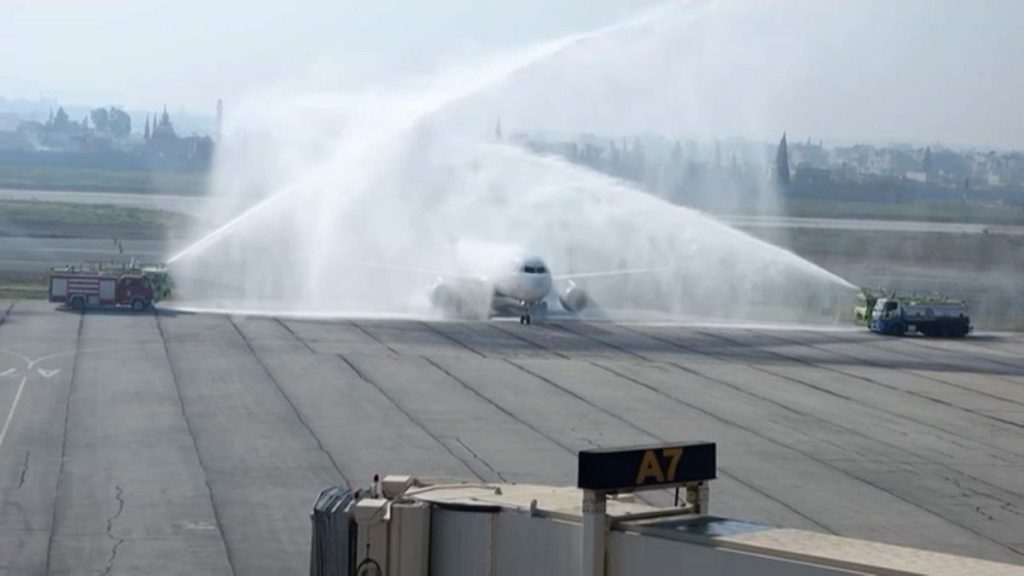The resumption of commercial flights in Syria marks a significant turning point in the nation’s ongoing struggle with internal conflict. For an extended period, Syrian airports remained eerily silent, devoid of the usual hustle and bustle of passenger air travel. Insurgent groups, vying for control against the established government, had advanced towards major cities, creating a volatile security situation that rendered commercial aviation too risky. This disruption in air traffic severely hampered Syria’s connection to the outside world, isolating the nation and exacerbating the difficulties faced by its citizens. The resumption of flights signifies a shift in the security landscape, suggesting that the threat posed by insurgent groups has, at least temporarily, subsided enough to allow for the safe operation of commercial airlines. This development offers a glimmer of hope for a return to normalcy, improved access to essential goods and services, and the potential for economic recovery.
The image of the White Helmets, formally known as the Syrian Civil Defence, welcoming the arrival of a Syrian Air flight is particularly poignant. This volunteer organization has been at the forefront of humanitarian efforts throughout the Syrian conflict, tirelessly providing rescue and relief services in the face of immense danger. Their presence at the airport, greeting the incoming flight, symbolizes a cautious optimism and a shared desire for stability and peace. The White Helmets, often operating in war-torn areas and confronting the devastating aftermath of conflict, represent the resilience of the Syrian people and their enduring hope for a better future. Their participation in this momentous occasion underscores the collective yearning for a return to peaceful air travel and the resumption of normal life.
The return of commercial flights holds multifaceted implications for Syria. Beyond the symbolic significance, the resumption of air travel has tangible practical benefits. It will facilitate the movement of people, goods, and essential aid, potentially alleviating the humanitarian crisis that has gripped the nation for years. The renewed accessibility to air transport can facilitate the delivery of medical supplies, food, and other vital resources to areas previously difficult to reach by land routes due to ongoing conflict or infrastructural damage. Furthermore, the re-establishment of flight connections can contribute to the revitalization of the Syrian economy, offering opportunities for trade, tourism, and investment.
The resumption of flights also carries significant geopolitical implications. It suggests a degree of stabilization in the security situation within Syria, which could pave the way for increased international engagement and the potential for diplomatic efforts to address the root causes of the conflict. The renewed ability to travel to and from Syria can facilitate the work of humanitarian organizations, diplomatic missions, and international observers, enabling them to better assess the situation on the ground and contribute to peacebuilding initiatives. Moreover, the resumption of air travel can foster communication and dialogue between Syria and the international community, potentially creating opportunities for reconciliation and reconstruction.
However, the resumption of flights is not without its challenges and potential drawbacks. Security concerns remain a paramount issue. While the current climate may permit a limited resumption of air travel, the threat of future disruptions due to renewed conflict or insurgent activity cannot be entirely dismissed. Ensuring the safety and security of airports, aircraft, and passengers will require a sustained commitment from the Syrian government and potentially the support of international partners. Furthermore, the resumption of flights could raise questions about the equitable distribution of resources and access to air travel, particularly given the ongoing economic hardships faced by many Syrians.
Moreover, the political context surrounding the resumption of flights is complex. The Syrian government’s role in the ongoing conflict, including allegations of human rights abuses, remains a contentious issue within the international community. The resumption of flights could be interpreted by some as an endorsement of the government’s actions, potentially complicating diplomatic efforts and hindering efforts to hold those responsible for wartime atrocities accountable. The international community will need to carefully consider the implications of engaging with Syria in light of these ongoing concerns. Balancing the need to support the Syrian people with the imperative to address human rights abuses will require a delicate and nuanced approach. The resumption of flights, while a positive development in many respects, must be viewed within the broader context of the ongoing political and humanitarian crisis in Syria. It represents a step towards normalcy but also underscores the complex challenges that lie ahead in the pursuit of lasting peace and stability.














